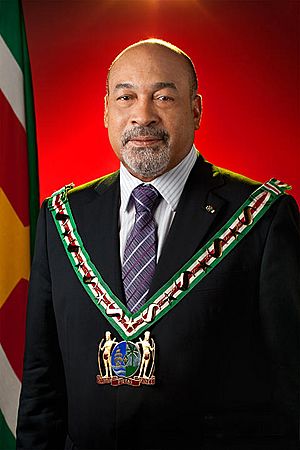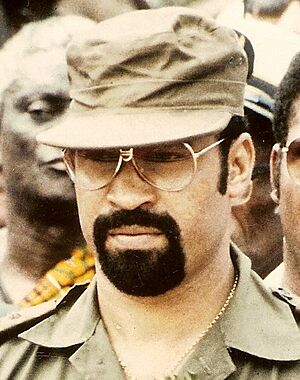Dési Bouterse facts for kids
Quick facts for kids
Dési Bouterse
|
|
|---|---|

Official portrait, 2010
|
|
| 8th President of Suriname | |
| In office 12 August 2010 – 16 July 2020 |
|
| Vice President | Robert Ameerali (2010–2015) Ashwin Adhin (2015–2020) |
| Preceded by | Ronald Venetiaan |
| Succeeded by | Chan Santokhi |
| President pro tempore of the Union of South American Nations | |
| In office 30 August 2013 – 4 December 2014 |
|
| Preceded by | Ollanta Humala |
| Succeeded by | José Mujica |
| President of the National Democratic Party | |
| In office 4 July 1987 – 13 July 2024 |
|
| Preceded by | Party established |
| Succeeded by | Jennifer Geerlings-Simons |
| Chairman of the National Military Council | |
| In office 25 February 1980 – 27 November 1987 |
|
| President | Johan Ferrier Henk Chin A Sen Fred Ramdat Misier |
| Preceded by | Office established |
| Succeeded by | Office abolished |
| Personal details | |
| Born |
Desiré Delano Bouterse
13 October 1945 Domburg, Suriname |
| Died | 24 December 2024 (aged 79) Suriname |
| Political party | National Democratic Party |
| Spouses |
Ingrid Figueira
(m. 1970; separated 1990)Ingrid Waldring
(m. 1990) |
| Children | 3, including Dino Bouterse |
Desiré Delano Bouterse (born 13 October 1945 – died 24 December 2024) was a military officer and politician from Suriname. He served as the President of Suriname from 2010 to 2020. He was a very important figure in Surinamese politics for many years.
Contents
Early Life and Military Career
Growing Up in Suriname
Dési Bouterse was born on 13 October 1945 in Domburg. This town is in Suriname's Wanica District. His family had a mix of backgrounds. These included Amerindian, African, Dutch, French, and Chinese roots.
When he was young, he moved to Paramaribo, the capital city. An aunt raised him there. He went to St. Jozefschool, which was a boarding school. Later, he attended the Middelbare Handelsschool, a type of junior secondary school. He did not finish this school.
Time in the Netherlands
In 1968, Bouterse moved to the Netherlands. There, he joined the armed forces of the Netherlands. After his first military service, he decided to train more. He became a non-commissioned officer at the Koninklijke Militaire School in Weert. During this time, he was known as a good athlete. He even led the basketball team.
In 1970, Bouterse married Ingrid Figueira. He had known her since they were teenagers in Suriname. They had two children, Peggy and Dino. Soon after their marriage, Bouterse was sent to a Dutch military base. This base was in Seedorf, Germany.
Return to Suriname
On 11 November 1975, Suriname became independent from the Netherlands. Bouterse returned home with his family. He wanted to help build the new Surinamese army. In 1979, he took on a new role. He became the chairman of a new military union. This union was called BoMiKa.
The Sergeants Coup
Taking Control
On 25 February 1980, a big change happened in Suriname. Bouterse, along with Roy Horb and fourteen other sergeants, took over the government. This event is known as the Sergeants Coup. The group of sergeants was called the Groep van zestien (Group of Sixteen). Bouterse was their leader.
After the coup, Bouterse became the chairman of the National Military Council of Suriname. This made him the main leader of the country. From 1980 until 1988, he was the real power. He had a lot of influence over the presidents who were in office.
Changes in the Country
Many people supported this military takeover at first. They hoped it would help fight corruption and unemployment. Unemployment was very high back then. The new military government made some big changes. They set an evening curfew, meaning people had to be home by a certain time. They also limited freedom of the press. Only one newspaper could publish, and it was carefully checked.
In 1985, political parties were banned. The right for people to gather freely was also limited. This period was known for challenges in government. The Netherlands, a former colonial power, stopped giving aid to Suriname. This made the country's economy unstable. The government also faced several uprisings during this time.
Transition to Democracy
Moving Towards Civilian Rule
Later in 1985, the government started to allow opposition parties again. This was the beginning of a move back to civilian rule. A new constitution was created. People voted on it in a referendum on 30 September 1987. Most people approved the new constitution.
Two months later, elections were held. Ramsewak Shankar, who was not aligned with Bouterse, was elected president. He took office in January 1988. This marked a shift back to a more democratic system.
President of Suriname (2010–2020)
Becoming President
In the 2010 elections, Bouterse's political group, the Mega Combination, became the largest party. They won 23 out of 51 seats in the parliament. This was a strong showing, but not quite enough for an absolute majority.
To get enough votes to become president, Bouterse worked with other parties. He teamed up with Ronnie Brunswijk's party, which had 7 seats. He also worked with the Peoples Alliance party, led by Paul Somohardjo, which had 6 seats.
On 19 July 2010, Dési Bouterse was elected as President of Suriname. He received 36 out of 51 votes. He officially took office on 12 August 2010. His running mate, Robert Ameerali, became the Vice President of Suriname.
Key Achievements as President
During his time as president, Dési Bouterse introduced several important programs. He brought in universal health care, which means more people could get medical help. He also started free school meals for children. A minimum wage was set, helping workers earn a fair amount. He also created a national pension scheme, which helps older people financially.
Illness and Death
Dési Bouterse passed away on 24 December 2024. He was 79 years old. He died after a short illness.
Images for kids
See also
 In Spanish: Dési Bouterse para niños
In Spanish: Dési Bouterse para niños
 | Claudette Colvin |
 | Myrlie Evers-Williams |
 | Alberta Odell Jones |




